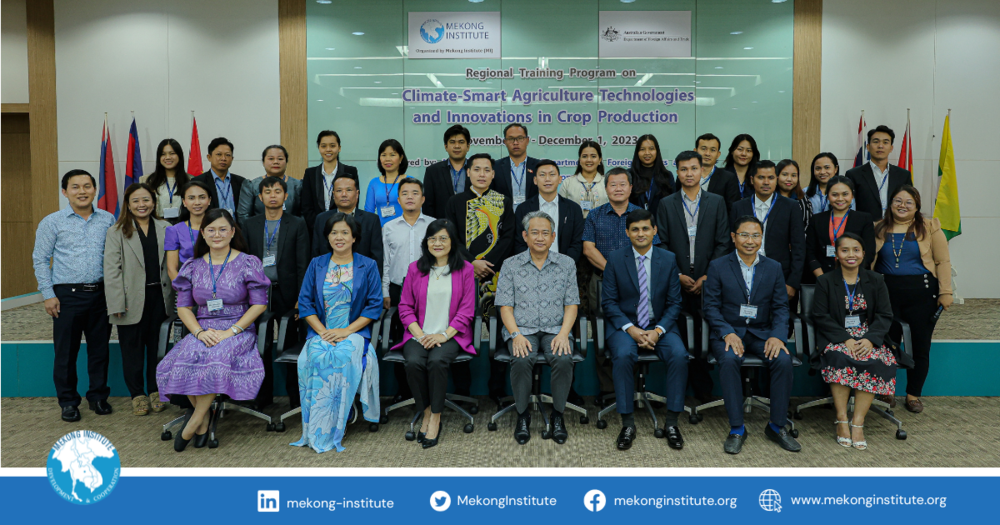Aimed at enhancing the capacities of agronomic service providers to catalyze wider technology adoption, Mekong Institute (MI) organized the Regional Training Program on Climate-Smart Crop Production Technologies and Innovations from November 27 to December 1, 2023 at the MI Training Centre in Khon Kaen, Thailand.
Supported by the Australian Government Department of Foreign Affairs and Trade (DFAT), the five-day training program equipped 29 representatives from national agencies, academic institutions, and Non-Governmental Organizations (NGOs) in the Lower Mekong Countries with hands-on knowledge on innovative yet replicable climate-smart crop production technologies in the region.
“The agriculture sector has long been the backbone of our economy. Yet, it is imperative to acknowledge the vulnerabilities that this sector now confronts due to the adverse impacts of climate change. Through the climate-smart agriculture (CSA) practices and technologies that you will learn from this training, we hope to foster a cross-border collaboration where we work together not only to mitigate the climate change impacts, but also to promote a resilient and sustainable agrifood value chain in the Greater Mekong Subregion (GMS),” emphasized by Mr. Suriyan Vichitlekarn, Executive Director of MI, during his opening remarks. He encouraged the participants to take the training as an opportunity to learn from one another, collaborate, and collectively pave the way for the promotion of CSA.
The training featured a robust curriculum, divided into five modules delivered by experts from the Asian Institute of Technology, Kasetsart University, National Electronic and Computer Technology Center (NECTEC), Hydro and Agro Informatics Institute (HAII), and Thailand Regional Agriculture Innovation Network (RAIN). Success factors in CSA adoption were shared by various organizations from Cambodia, Lao PDR and Vietnam. One of the course’s practical teaching strategies was the learning visit to the Phu Tham Phu Kratae Forest Community which exposed participants to CSA best practices on sustainable, community-based water management.
In his message during the Closing Program, Mr. Shayne Mckenna, First Secretary (Development) of the Australian Embassy in Bangkok, extended his appreciation to the participants for their interest in attending the training. He highlighted that the Australian Government acknowledges the importance of building the resilience of the agriculture sector in the region, including it as one of the priority areas in its Mekong Australia Partnership – Water, Energy and Climate Change (MAP-WEC) portfolio.
This is the first training under the project Promoting Climate-Smart Agriculture Technologies and Innovations in Lower Mekong Countries, which sought to build the capacity of Cambodia, Lao PDR, Thailand and Vietnam (CLTV) in supporting farmers and food producers to adopt CSA approaches sustainably.








